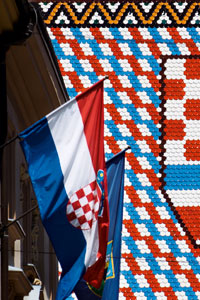Odd as it may seem to some, there are those who still yearn be a part of the EU. Croatia has just proven it. The country is now scheduled to become the EU’s twenty-eighth member state after its citizens endorsed EU accession on January 22; and it matters little that it was the lowest turnout for an EU accession referendum in history. In spite of only 43.65 percent of all eligible voters casting their ballots, the Croats showed their half-hearted support with a two-to-one margin.
The EU’s changing face
EU membership was once perceived the certain road to wealth and prosperity. Nevertheless, its repute is now blemished for having been unable to come to grips with the sovereign debt crisis that has engulfed numerous of its 17 euro-implementing members.
Yet, the EU’s model of interstate collaboration, the principle of camaraderie, the achievements of the European peace project, and the single market, still wield the power of attraction to outsiders.
But as the lacklustre accession referendum has shown, even Croatia’s once boiling enthusiasm to join the union has ebbed significantly. Croatia’s 4.5 million people may fear that after 20 years of rebuilding their war-devastated economy, they will get unavoidably drawn into the EU’s financial problems, and even require bailing out its southern neighbours. But Prime Minister Zoran Milanovic summed the country’s sentiment up with one sentence recently, saying: “The situation is not great but Croatia has no better option than the EU now.”
Stringent adjustments for accession
The feeling of success cannot be shaken off, however. After a seven year process of integration, Zagreb at last attained what it had been working extremely hard for – the end of deliberations, a signature under its accession treaty, and the support of its people. In order to become a member of the club, Croatia had to follow the criteria established under Copenhagen, which was expressly set up for the former Yugoslav republics.
Several regulatory and socio-economic changes had to be made and Croatia was subjected to stringent procedures to implement a full range of reforms in numerous areas. These included more transparency in political financing and public procurement, and a stronger anti-corruption law and welfare system. The EU also requested the privatisation of its shipyards in compliance with Europe’s competition rules. Moreover, the telecoms sector also had to be transformed through market liberalisation. Among others this meant that the nation’s leading provider of telecommunications services, T-Hrvatski Telecom, became majority owned by German group Deutsche Telekom. Privatisations are likely to continue as Croatia remains under an EU monitoring scheme until its full membership commences in July 2013.
A tough path
But accession to the EU carries important implications for Croatia, a country for which the memories of the four-year war and the economic repercussions are still very much alive and well. Many believe that unless Croatia manages to clean its socio-economic affairs before its membership next year, another limping economy will attach its heavy burdens to the EU and further aggravate the bloc’s existing issues. For the EU, which is already under financial duress, this would simply spell an added debt burden, a heavier load for EU taxpayers and a higher risk of sovereign loan defaults- Something the union cannot afford as it has shown over the past two years.
Meanwhile, Croatia is simultaneously struggling to clamber out of the recession brought on by the same calamity. The country presently relies on its strong tourism revenues which helped support economic growth in Croatia in the final two quarters of last year. But this is not likely to save Croatia’s economic problems according to the country’s central bank governor Zeljko Rohatinski, who insists that Croatia needs to cut its expenditure by around €1.2bn if it is to avoid another credit rating drop and to ensure economic growth in the near future.
Even Fitch ratings recently singled out the BBB- nation for being a risky economy for several reasons. According to the agency, Italian parent banks account for almost 48 percent of Croatia’s entire banking assets. This makes the country’s exposure the highest of any CEE banking market to a single ownership base. In addition, Fitch pointed out that Croatia has the CEE’s highest exposure to foreign credit risks, with cross border claims on its economy totalling around 52 percent of GDP. Italy remains meanwhile a significant trading partner for Croatia, while Italian banks Intesa SanPaolo and UniCredit are in control of the country’s two biggest banks and jointly make up almost 50 percent of bank assets.
Many believe that the Croatia’s subsidiary banks could see their asset quality depreciate should Europe’s debt fallout affect Italian banks. But problems are also emerging in the telecoms sector, with companies such as T-Hrvatski Telekom announcing redundancies as early as the first quarter of this year.
Croatia, after seven years of trying to play with the big boys, has at last reached its goal. It is clear that it perceives the EU as a long-term investment and hopes it will turn things around so Croatia can surface a winner in the long run. To some Croatia is already a winner as it will not have to join the euro until 2016.
Meanwhile, considering the hardship the EU is currently facing, Croatia’s yes vote comes as a great comfort. A “no” vote would have implied a glaring failure for the Union and would have also been catastrophic for the accession plans of other nations within the region.
There is no doubt that the EU is currently dealing with the toughest challenge since its inception; it is itself fighting for survival. But, although this enlargement has come at the wrong time in terms of financial sustainability, the timing could not be better for providing the EU with the much-needed confidence boost.





